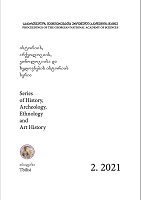კულტურულ-ისტორიული ურბანული ლანდშფტის მართვის გამოცდილება მსოფლიოს სხვადასხვა ქვეყანაში და XXI საუკუნის ურბანული გამოწვევები (ავსტრალია, ჩინეთი, ეკვადორი, პაკისტანი, ტანზანია, იტალია, ნიდერლანდები და საქართველო)
Cultural-historical urban landscape management experience in different countries of thr world and 21st century urban challenges (Australia, China, Ecuador, Pakistan, Tanzania, Italy, the Netherlands and Georgia)
Author(s): Ketevan AkhobadzeSubject(s): Cultural history, Museology & Heritage Studies, Preservation, Sociology of Culture, Environmental interactions, Globalization
Published by: საქართველოს მეცნიერებათა ეროვნული აკადემიის გამომცემლობა
Keywords: Culture; Cultural Values; Society; Ecology; Ecology of Culture; HUL models; UN; UNESCO;
Summary/Abstract: The article is dedicated to the UNESCO World Heritage Program, in particular, the issues of preservation and protection of historic urban landscapes. The article discusses how the UNESCO World Heritage Program seeks to fulfill its mission of preserving the World Cultural Heritage, which is of particular universal importance to humanity, both for present and future generations. We understand well that cities differ in their culture and historical development. Uncontrolled urbanization threatens the heritage and often raises the issue of its deterioration and destruction, which raises the fear of losing the identity in the society, the important “places” for them, the local cultural monuments. These issues are well reflected in the UN and UNESCO documents. In the conditions of globalization, cities are so similar in financial, technological, informational and other characteristics that they lose their different appearance and become like analogues. Therefore only culture and heritage is the only resource that always separates peoples, cities and differentiates from each other. Powerful cities creatively incubate, creating a stimulating and engaging environment in a variety of cultural fields to showcase the unique features of their local culture that increase international visibility in a global context. The values of the society and the ways of their expression are reflected in the culture. Cultural resources are a distinguishing feature of our cities. Therefore, these UN recommendations were developed in 2011 to better implement urban management programs. Such are the HUL approaches for all UNESCO member countries that voluntarily agree to take action that does not necessarily seek to change existing doctrines or approaches to conservation, but is an additional tool of cultural policy proposed by UNESCO, in which the overall objectives of urban development can be seen, however, clearly shows the value of cultural variety, which distinguishes them. The article provides 7 guidelines that describe the need for and application of HUL approaches in different countries, showing examples of their experiences. The article provides a comparative analysis of current processes in Georgia, as well as the need to use HUL approaches.
- Issue Year: 2021
- Issue No: 2
- Page Range: 163-191
- Page Count: 29
- Language: Georgian

